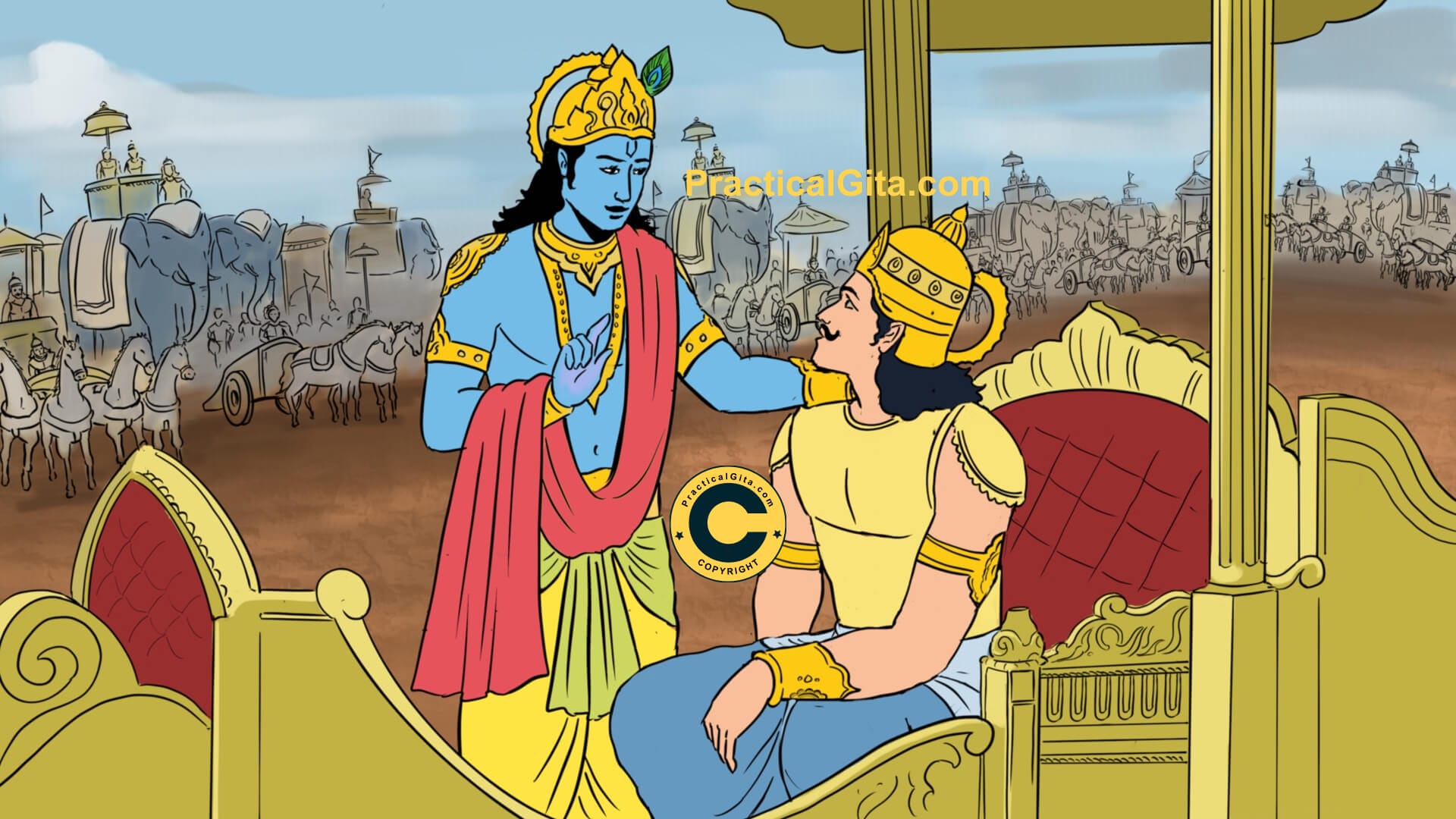Physical Address
304 North Cardinal St.
Dorchester Center, MA 02124
Physical Address
304 North Cardinal St.
Dorchester Center, MA 02124


In a verse (Ch. 1, verse 45-46), Arjuna expresses his aversion to killing, even when defending his own life:
अहो बत महत्पापं कर्तुं व्यवसिता वयम् |
यद्राज्यसुखलोभेन हन्तुं स्वजनमुद्यता: || 45||
यदि मामप्रतीकारमशस्त्रं शस्त्रपाणय: |
धार्तराष्ट्रा रणे हन्युस्तन्मे क्षेमतरं भवेत् || 46||
aho bata mahat pāpaṁ kartuṁ vyavasitā vayam
yad rājya-sukha-lobhena hantuṁ sva-janam udyatāḥ
yadi mām apratīkāram aśhastraṁ śhastra-pāṇayaḥ
dhārtarāṣhṭrā raṇe hanyus tan me kṣhemataraṁ bhavet
Alas! How strange it is that we have set our mind to perform this great sin. Driven by the desire for kingly pleasures, we are intent on killing our own kinsmen. It will be better if, with weapons in hand, the sons of Dhritarashtra kill me unarmed and unresisting on the battlefield.
Bhagvad Gita 1.45-46
A smiling lord Krishna responds thus (Chapter 2 verse 31)
स्वधर्ममपि चावेक्ष्य न विकम्पितुमर्हसि |
धर्म्याद्धि युद्धाच्छ्रेयोऽन्यत्क्षत्रियस्य न विद्यते || 31||
swa-dharmam api chāvekṣhya na vikampitum arhasi
dharmyāddhi yuddhāch chhreyo ’nyat kṣhatriyasya na vidyate
Besides, considering your duty as a warrior, you should not waver. Indeed, for a warrior, there is no better engagement than fighting for upholding of righteousness.
Bhagvad Gita 2.31
The first question we need to ask is: why did Arjuna refuse to fight? He understands that ahimsa (non-injury) is at the core of dharmaDharma is an important Hindu, Buddhist and yogic concept, referring to a law of righteousness and satya (truth), giving order to the customs, behaviors and ethics which make life possible. It can also be understood as a law of the universe, governing everything from worldly affairs to daily routines... More, and he feels that by fighting he will have to violate this principle.
Why, then, would Krisha insist that Arjuna fight?
Dharma-yuddah (a righteous battle) is fought for the protection of dharmaDharma is an important Hindu, Buddhist and yogic concept, referring to a law of righteousness and satya (truth), giving order to the customs, behaviors and ethics which make life possible. It can also be understood as a law of the universe, governing everything from worldly affairs to daily routines... More (righteousness), for the benefit of society, and with an attitude of not causing greater harm. Adharma-yuddha (an unrighteous battle) is fought to subjugate people, take away their freedom, harm them, or destroy them.
We can find an example of an adharma-yuddha in recent history when the USA fought in Vietnam in the 60s and 70s. They were not fighting to protect themselves. They were trying to end communism and supporting the government of South Vietnam against the North. It was a war in opposition to their own principles, and this opposition caused great loss of life on both sides.
On the other hand, in World War II, the USA joined with the British forces against Germany because they felt that if they didn’t fight now it would also affect or diminish freedom in America. To not have fought in this situation would have been against their own principles. So, such a war becomes an example of dharma-yuddha.
While war is undesirable in all cases, sometimes it becomes necessary to avoid facing greater harm. The decision to not fight in World War II would have led to more significant consequences, so it was considered a war of dharmaDharma is an important Hindu, Buddhist and yogic concept, referring to a law of righteousness and satya (truth), giving order to the customs, behaviors and ethics which make life possible. It can also be understood as a law of the universe, governing everything from worldly affairs to daily routines... More.
Why did Krishna want Arjuna to fight? Because the battle of Kurukshetra was of a dharma-yuddah nature. The alternative option of not fighting would cause more harm than suffering.
Consider this image:
Someone takes a sharp knife and cuts you open from your chest to the navel, and starts operating on your insides.
Of course, this sounds like a horrible experience.
However, what if the alternative were death? If performing open-heart surgery means you will have a chance at living, wouldn’t you accept it rather than die?
The point is that dharma-yuddha is like heart surgery: the procedure will cause great harm and trauma to the body, but the only other option is to not live.
All battles and wars cause harm, but we have to choose wisely and take a deeper look at why wars happen in the first place.
We have to accept that there is a difference between immoral wars and ethically justified wars, and Krishna’s advice in the Gita is primarily about how to handle ourselves when we are forced to fight an ethically justified war.